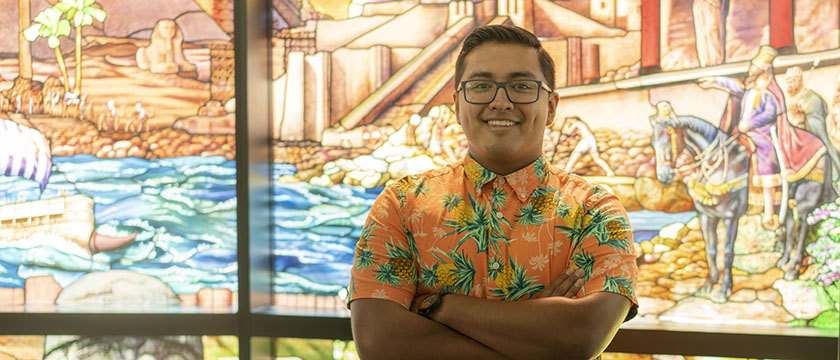

As a child, Isaac Zamudio Zarraga would sit in front of the television, watching episodes of “Dexter’s Lab,” and think about how to make moving machines that could solve problems. He’d sketch ideas for devices and knew that that was what he wanted to study. Robots fascinated him.
“I grew up with this idea that I could build robotic arms for people in need of prosthetics,” he says. “Technology is a great blessing and can bring solutions to many problems.”
His passion, at times, felt like a faraway dream. Neither of Zamudio’s parents finished high school, and he was the first person in his family to pursue a college degree. He enrolled in classes right after high school, while living in Mexico City. But then, halfway through college, he met his wife-to-be. She was from Pennsylvania – 2,600 miles away.
He decided he needed to move to the States and be with the woman he loved. “I quit school and decided that once I got my papers I would continue in the U.S.”
In 2016, the newlyweds settled in Utah while Zamudio’s new wife finished up at Brigham Young University. But continuing his own education proved difficult. First, there was the language barrier.
“My entire life, I always took English classes, but I never passed,” he says. “When I started dating my wife, I picked up more and more. I’d watch movies in English to figure out the grammar and sentence structure, but once I moved here, I realized how much I didn’t know.”
Even once he became fluent, other frustrations arose. The most annoying was the realization that when it came to his degree, credits from Mexico wouldn’t transfer. He’d have to start from zero. Still, he was undeterred. And when he saw how hands-on the Electrical Automation and Robotics Technology (EART) program was at Utah Valley University, he knew he’d found a new academic home.
“In Mexico City, we learned from books or just the concepts,” he says. “Here, we learn by actually building things and figuring out real-life problems.”
Zamudio will finish his Associate in Applied Science in Robotics in December. After, he wants to earn a bachelor’s degree in technology management, a goal he wouldn’t have thought to pursue if he hadn’t won the Victor L. Davies Scholarship for EART students.
“This is my second year applying and receiving this scholarship,” he says. “When I saw the application the first time, I was so happy that UVU offered funding for my specific area and for students with a strong work ethic. The support of the donors has really made my academic life easier.”
In July, after only three semesters at UVU, his practical experience afforded Zamudio a chance to compete at the SkillsUSA National Championship, where he and a partner brought home the gold medal in robotics and automation technology. He’s currently working on a new machine that he’ll enter in UVU’s annual Engineering Technology Fair.
“When I started my education here, I wasn't expecting to win national competitions,” he says.
He still dreams of building prosthetics, but his goal has shifted somewhat. Once he graduates in 2021, he hopes to enter the workforce in a role that will make a difference. “I want to work for a company that will help the community,” he says. “I used to think that prosthetics would be the only way I could help people through robotics. But my education has opened my mind. Technology can help humanity in so many ways. I love finding solutions for people.”

